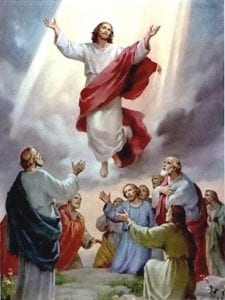
The Ascension is an important event not only in the life of Christ but also in the life of the Church. The two primary scripture passages on the Ascension are found in the Gospel of Luke (24:50-51) and the Acts of the Apostles (1:9-11). The event of the Ascension, which took place forty days after the Resurrection, links the life of Jesus in the Gospels to the life of the Church in the Acts of the Apostles. The Ascension also paved the way for the coming of the Holy Spirit at Pentecost, which ushered in the age of the Church. Scripture asserts that the Ascension was the necessary condition for the descent of the Holy Spirit, for it says that the Spirit will come only when Christ has been glorified (Jn 7:37-39; 15:26; 16:7; Ac 1:4-11).
With His Ascension, Jesus left His disciples on earth and reunited with His Father in heaven. Why is the mysterious absence of Christ important for the Church? What does it achieve? On the one hand, it confirms that Christ appears before the Father as the sole Mediator on behalf of humanity (Heb 9.24). On the other hand, Christ’s absence calls us to faith. The Gospel of John is strongly rooted in the idea that Christ’s absence is beneficial for faith. Jesus said: “It is to your advantage that I go away (Jn 16:7)” and “Blessed are those who have not seen and yet have come to believe (Jn 20:29).” Christ appeared to the disciples many times after the Resurrection so that they might believe the reality of His Resurrection; however, it was His Ascension that made it possible for them to no longer think of Him merely in a bodily sense. Like the disciples, we are called to contemplate the ascended Christ through faith.
The action of the Trinitarian God in salvation history is that the Father sends the Son, in order that the Son may live, die, rise, and ascend in the flesh, so that the Spirit may come and bestow on us the gift of faith which unites us with the Father, through the Son, and by the Holy Spirit. Having an awareness of this Trinitarian action allows us to experience the love of God and the grace of Christ in the fellowship of the Spirit.
The Ascension of Jesus’ resurrected body does not mean that Jesus can never be present to us in this world. By the power of the Holy Spirit, Jesus is made present to us sacramentally in the Eucharist. The Eucharist does not immediately usher us into heaven, but it gives us the strength to journey to heaven. The real presence of Christ in the Eucharist is Jesus’ way to make Himself present to us, even after He has ascended into heaven. The last thing that Jesus said in the Gospel of Matthew was: “I am with you always, until the end of the age (Mt28:20).” Jesus meant it in a very real sense and the Eucharist fulfills that promise.
What is the significance of the Ascension of the Lord?
- Jesus Christ accomplished His mission on earth.
- Christ now reigns on earth in His Church until all things are subjected to Him at His second coming in glory.
- Christ’s reign in His Church is still under attack by the evil powers, even though they have been defeated definitively by Christ’s suffering, death and resurrection.
- We are at the last hour. It is a time of watching and waiting for the second coming of Christ. (CCC 670, 672)
- Before Christ’s second coming, the Church must pass through a final trial that will shake the faith of many believers.
- The persecution will unveil the “mystery of iniquity” in the form of a religious deception offering men an apparent solution to their problems at the price of apostasy from the truth.
- The supreme religious deception is that of the Antichrist, a pseudo-messianism by which man glorifies himself instead of God. (CCC 675)
- God’s triumph over the revolt of evil will take the form of the Last Judgment after the final cosmic upheaval of this passing world. (CCC 677)
Christ’s Ascension into heaven where He sits at the right hand of the Father attests that He is Lord of eternal life.
The right to pass judgment on the works and hearts of men belongs to Him as redeemer of the world.
Yet the Son did not come to judge, but to save and to give life to the world. By rejecting God’s grace in this life, one already judges oneself, and can even condemn oneself for all eternity by rejecting the Spirit of love. (CCC 679)